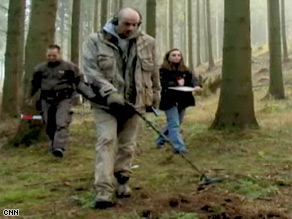 Those of you who are regular readers, or have gone through the archives of my posts, know of my gripes against the auto industry and the money they're asking for and taking, while still making lots of money... but here's something you don't hear about:
Those of you who are regular readers, or have gone through the archives of my posts, know of my gripes against the auto industry and the money they're asking for and taking, while still making lots of money... but here's something you don't hear about:If you've been laid off, worried about job security, money being tight, not being able to pay your bills etc....and you just bought a hyundai... Don't worry about it!! Hyundai will take your car back...
The automaker's new incentive program aims to reassure car buyers who are worried about losing their jobs.
Hyundai Motor America is taking aim at Americans' worries about job security: If you buy a new Hyundai and lose your job within a year, you can give it back.
"In this uncertain economy, we are looking for ways to reassure shoppers that Hyundai still represents the best value in the auto industry," said John Krafcik, president and chief executive of Hyundai Motor America, the U.S. arm of the South Korea-based automaker, in a company statement.
"If you find that you cannot make your payment because of a covered life changing event, we'll allow you to return your vehicle and walk away from your loan obligation - and in most cases we will cover most, if not all of the difference," the carmaker's Web site says.
With no extra charge to the sticker price, the program pays the difference between the car's trade-in value at the time the owner files a claim and any remaining balance on the loan up to a maximum of $7,500.
"Hyundai is offering the program because its own market research showed car shoppers weren't attracted by rebates and other more normal incentives", said Joel Ewanick, Hyundai America's vice president for marketing. "People are simply too worried about making payments no matter how good the deal is," he said.
"Until they saw a change in that, customers just aren't going to buy," he said.
As defined by Hyundai, life changing events include involuntary job loss, personal bankruptcy if self-employed, getting transferred overseas and accidental death. The benefit will be given to any qualified Hyundai vehicle buyer or lessee, the carmaker says, regardless of health or employment history.
To get the benefit, the vehicle buyer must have made at least two payments before filing for the benefit, and buyers are responsible for any payments due before filing.
The program is managed by a Walkaway USA, a subsidiary of Dallas-based EFG Companies, which provides finance and insurance products and support services for auto dealers.
"The goal is that this gives the consumer the opportunity to avoid default and maintain their credit rating," said Jeff Beaver, senior vice president for marketing at EFG Companies.
Walkaway said it has been selling a similar program as an extra-cost product through various auto dealers in Canada since 2000. The company recently began offering similar plans in the U.S., but Hyundai will be the only manufacturer offering the plan nationally.
The program neatly fits the needs of Hyundai's market said Art Spinella, an analyst with CNW Market Research, and it builds on the 10-year 100,000 mile warranty that Hyundai began offering in the U.S. in 1998.
"Hyundai has kind of carved its own niche with warranties and it's been successful with it," he said.
The program should appeal to Hyundai buyers, according to Spinella, because they tend to have lower household incomes and are more likely to be worried about income loss than buyers of more expensive cars.
Customer value
Since the program is offered on all Hyundai vehicles with no extra charge, it's impossible to say whether it would really be worth it to consumers, said Peter Sorgenfrei, a New York-based automotive marketing consultant. It would depend on whether the dealer would have charged less for the vehicle without the protection, but it's impossible to know how much less.
Given the low odds even in today's economy, that any given Hyundai buyer would lose his or her income within a year, the protection wouldn't add much value to the typical consumer, according to Sorgenfrei. "Not a lot of people are going to take advantage of it," he said.
"Few of those drivers who lose their income," he said, "would want to give up a car they would need to find a new job and then commute to it."
"But some customers might want to trade in their new Hyundai for a less expensive used car," said EFG's Beaver, so the program benefits dealers by turning a customer with a financial problem into another potential sale.
While Hyundai will be the only carmaker offering a national program, Walkaway plans to allow auto dealers selling any brand to offer the program, said Beaver.
Regardless of the dealer or the vehicle brand, 12-month protection plans would always be offered at no extra charge, Beaver said, but customers could also purchase longer-term plans for an extra charge. Hyundai dealers will soon be able to offer longer coverage at additional cost, said Hyundai's Ewanick.
But even if it's never used, Sorgenfrei said, the plan has public relations value: The program should drive some car shoppers to at least consider a Hyundai and it will make them feel cared for.















